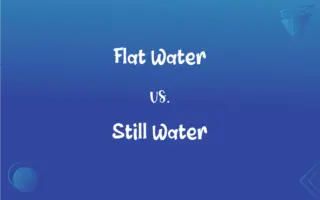Small vs. Young: What's the Difference?
Edited by Aimie Carlson || By Janet White || Published on January 2, 2024
"Small" refers to limited size or amount, while "Young" denotes an early stage of life or development.

Key Differences
"Small" pertains to physical dimensions or quantity, indicating something is lesser in size, amount, or degree. "Young," in contrast, relates to the early period of existence, typically used for living beings indicating their early age or immaturity.
In usage, "small" is often employed to describe objects, spaces, or quantities, emphasizing their diminutive nature or scale. "Young," however, is used to describe living beings, particularly humans and animals, highlighting their youth or the early stages of their life cycle.
"Small" can also imply insignificance or lesser importance in some contexts, but in physical terms, it strictly relates to size. "Young," conversely, carries a temporal implication, referencing the proximity to the beginning of one's life or existence.
The term "small" has no temporal connotation and does not change with time, whereas "young" is transient, indicating a state that changes as the subject ages.
"Small" is a relative measure of size or quantity, while "young" is a relative measure of age or early development stage, specific to living beings.
ADVERTISEMENT
Comparison Chart
Definition
Pertains to size or amount
Refers to an early stage of life or development
Usage Context
Objects, spaces, quantities
Living beings, particularly humans and animals
Implication
Physical dimensions, sometimes significance
Age, temporal proximity to life's beginning
Temporal Aspect
Static, does not change with time
Transient, changes as subject ages
Relative Measure
Size or quantity
Age or developmental stage
ADVERTISEMENT
Small and Young Definitions
Small
Limited in size.
The small kitten fit easily in the palm of my hand.
Young
Lacking experience.
He's young and naive about the business world.
Small
Lesser in importance.
She focused on the small details of the project.
Young
Of or pertaining to the early part of life.
Her young mind was full of curiosity.
Small
Narrow in scope.
They live in a small town.
Young
Early in life or development.
The young girl played in the park.
Small
Minimal in degree.
There's a small chance of rain tomorrow.
Young
Newly created or begun.
It's a young company, just starting out.
Small
Low in intensity.
He spoke in a small voice.
Young
Fresh or vigorous.
The trees are young and thriving.
Small
Being below average in size
A small car.
Young
Being in an early period of life, development, or growth.
Small
Being below average in quantity or extent
A small donation.
A small project.
Young
Newly begun or formed; not advanced
A young biotech company.
FAQs
Can "small" apply to abstract concepts?
Yes, such as a small amount of time.
Does "young" always mean a person is a child?
No, it can apply to any early stage of life.
Can "young" describe non-living things?
Yes, like a young company or a young wine.
Does "young" imply inexperience?
Often, but not necessarily.
Does "young" change its meaning over time?
Yes, as the subject ages, it's no longer young.
Is "small" only used for physical size?
Primarily, but it can also refer to quantity or significance.
Can "small" be used positively?
Yes, like in "small but mighty."
Can "small" have a subjective interpretation?
Yes, what's small to one may not be to another.
Is "young" used in a time context?
Yes, referring to an early time in a lifespan.
Can "small" mean trivial?
In some contexts, yes.
Can "small" refer to a short duration?
Yes, like a small amount of time.
Is "small" a relative term?
Yes, it's often used comparatively.
Is "young" used for plants and animals?
Yes, for any living being in early development.
Is "young" always relative to age?
Primarily, but it can also indicate freshness or newness.
Does "young" have a cultural aspect?
It can, as perceptions of youth vary by culture.
Can "young" imply vigor or freshness?
Yes, especially when describing ideas or movements.
Can "small" be used in a non-physical sense?
Yes, like small efforts or small changes.
Can "small" denote closeness or intimacy?
Yes, in phrases like "small circle of friends."
Does "young" indicate a specific age range?
It's relative to the lifespan of the subject.
Is "small" often used in measurements?
Yes, for indicating lesser quantities or dimensions.
About Author
Written by
Janet WhiteJanet White has been an esteemed writer and blogger for Difference Wiki. Holding a Master's degree in Science and Medical Journalism from the prestigious Boston University, she has consistently demonstrated her expertise and passion for her field. When she's not immersed in her work, Janet relishes her time exercising, delving into a good book, and cherishing moments with friends and family.
Edited by
Aimie CarlsonAimie Carlson, holding a master's degree in English literature, is a fervent English language enthusiast. She lends her writing talents to Difference Wiki, a prominent website that specializes in comparisons, offering readers insightful analyses that both captivate and inform.

































































